Home > Laser Eye Surgery > FAQs
These questions concern patients interested in laser eye surgery abroad.
In order to determine if you can have the operation, you will need to have (painless) pre-operation examinations carried out. These examinations are carried out in Grenoble, Amsterdam or Istanbul. There is no waiting list, you can simply tell us which date would suit you (our clinics are very flexible). Around 90% of patients can have the operation.
It is important to note that you can go to an eye clinic in the UK to determine if you can be operated but the examinations should also be carried out in the clinic where you will have the operation, as the data collected is used to programme the laser.
Moreover, these clinics currently possess the best performing equipment (operation using the LASIK technique with INTRALASE brand femtosecond laser, which is famous as it is accredited by NASA to operate astronauts) allowing it to operate on patients who have been declared non-operable by Lasik in other clinics (and who have therefore been offered intra-ocular implants, a much more invasive operation, or PRK, which is more painful).
Novacorpus organises:
– Myopia (short sightedness) operation
– Astigmatism correction
– Presbyopia correction
– Hyperopia (long sightedness) operation
These operations are performed by Intralase femtosecond Lasik. In some rare cases (<5%), PRK can be necessary (see next question for details). Laser vision correction by Intralase femtosecond Lasik is a technique for operating on the eyes which used to be reserved for spacemen and professional pilots. Novacorpus is contributing to making refractive surgery accessible to everyone, offering you an operation to correct vision at a reduced price in cutting-edge clinics.
1) Anesthesis using anesthetic eye drops
2) Creation of a flap on the cornea with the Intralase femtosecond laser (or by microkeratome, the electric knife for LASIK)
3) Opening of the flap by the ophtalmologist
4) The cornea is sculpted by the 2nd laser (Excimer)
5) The ophthalmologist closes the flap again
Total duration: around 10 minutes per eye (Laser time: less than a minute per eye!)
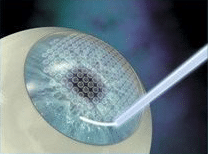
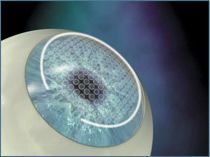

The mechanical or bistoury method is a technique which is now old fashioned and has been abandoned in the most modern clinics as it is more risky than the 100% laser technique. We do not perform it nor recommend it.
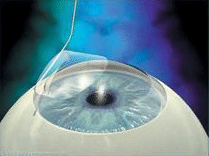
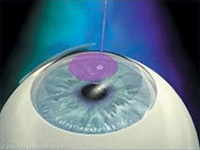
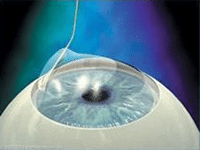





In a very small percentage of case (<5%) the cornea is too thin to do a corneal flap and the PRK method has to be used. It is the same as above except that the superficial layer of the cornea is dissolved. It hurts a little more but long-term results are as good. Using hight performance lasers like in Novacorpus clinics, increases your chance to get a femtosecond LASIK.
We distinguish 3 methods of laser eye surgery. In order of age:
1) PRK, a method which is now outdated as it is old and painful. It has been all but abandoned by large, modern and well-equipped clinics (except for <5% of patients where it is the only possible method).
2) LASIK (with the opening of a flap on the cornea with an electric bistoury), a more modern method but now outdated. It, too, has been all but abandoned by large and modern clinics.
3) LASIK femtosecond (or LASIK 100% laser) which has become the standard in terms of results and reliability. For the clinic, this means that a second laser called ‘femtosecond’ needs to be bought. This opens the corneal flap and is not the same as the one which sculpts the cornea to correct its thickness (called “excimer”). The most effective model of femtosecond laser is the Intralase femtosecond laser, used for astronauts for example. When choosing the clinic in which you will have the operation, we advise you to ONLY select clinics equipped with Intralase femtosecond laser because this means that they are carrying out enough operations to be able to invest in the best performing, and therefore the safest technology (a good clinic changes its lasers at least every 5 years). This is a measure of heightened safety and quality for your eyes.
For eye operations to correct myopia, astigmatism, hyperopia or presbyopia, femtosecond laser technology does away with the use of a bistoury and allows a very fine corneal flap to be detached solely through the intervention of a laser. Moreover, femtosecond laser is the only method recommended for eyes with a very rounded or very flat cornea. It also allows for operations to be carried out on very thin cornea which, up to now, were inoperable by the traditional method. Femtosecond lasers from the Intralase brand are considered the best due to the thinness of the flap they are able to detach. Today we can draw on several years’ experience of this method (since 2001). Few centres are, however, equipped with this cutting edge technology.
Of course, indeed we would recommend this. Going for treatment abroad is much more pleasant in good company. The slight increase in cost associated with being accompanied (train or plane fare and hotel) is largely compensated for by the benefits of having someone with you.
Yes. However, a third person should be available to drive your car (if you come by car).
If you are myopic (and this myopia is not very serious), improvement takes place very quickly (in a few hours). This is a bit slower in the case of serious astigmatism or hyperopia (especially strong hyperopia) – maximum improvement is attained in a few months.
This depends on the configuration of your eye, in particular your cornea. Whether or not you are suitable for laser eye surgery can only be determined after you have had pre-operation examinations (which are painless). However, 90% of patients can be operated.
Yes, this is possible. It is important to note that, afterwards, sight fluctuations may occur during pregnancy and breastfeeding, but these are reversible.
Yes, no problem.
In Grenoble, France
– you will come for a half or full day and have the pre-operative examinations, the operation (if possible) and the first post-operative check-up.
– you will spend one night in Grenoble (at a hotel – the operation does not require you to go to hospital) and will have a check-up the following morning at the clinic.
– you can then either come back for the subsequent check-ups (in general, 10 days and 1 month after the operation), or make appointments with an ophthalmologist nearer to where you live (make sure that they have the necessary experience to carry out these check-ups)
In Istanbul, Turkey
A typical stay at the ophthalmolgical clinic in Istanbul:
– 4 days and 3 nights on site (can be reduced to 3 days and 2 nights)
– You will be picked up from the airport and taken to the clinic, where you will have an individual room (all included in the price)
– Pre-operative examinations are carried out the day after you arrive (2nd day)
– The operation is done on the 2nd day
– A 1st check-up is also carried out on the 2nd day and then everyday until you leave
Here are some examples of the price differences.
Compared to Normal Price in UK: £3,410 for both eyes
Per eye
from £1,125
Per eye
from £440
Per eye
from £2,000
For prices on all surgeries, please see:
You will indeed make large savings through going abroad to be treated. Find out more. Nevertheless, we also recommend that good quality treatment should be your priority and that you should carefully seek advice before leaving as regards the doctor and clinic.
Our prices are extremely competitive. We believe that the large savings you make should not be offset by risks taken as regards the quality of the treatment and the prices we offer allow the clinic to purchase the best equipment and to work with the best specialists. If you find a cheaper offer, check the following points carefully:
– Does the clinic offer the same safety guarantees? (at least 2000 operations per year; a doctor who carries out at least 500 operations/year as well as several years’ experience.
– Will they take the time to explain the various options to me? Will they use the most up-to-date technology?)
– Does the doctor speak my language?
– Does the price entail other obligations? (e.g. many months’ waiting time; impossible to choose the day of the operation or the individual who will carry it out; operation in a public hospital rather than a private clinic)
– Is the price for both eyes or just one?
– Does the price include the pre-operation examinations, medication and post-operative checkups?
– Is the price in Pounds?
We will do everything in our power to avoid this, through selecting up-to-date doctors and clinics. These doctors will give you all the necessary recommendations for good post-operative follow-up and will eventually recommend you a colleague near to where you live if necessary for a certain period. It is, however, impossible to eliminate all risks of complication in medicine. It should be noted that complications are not necessarily attributable to the doctor’s responsibility. They can sometimes occur due to a pre-existing condition, bad luck, or negligence by the patient. This is as likely to happen in your own country as it is elsewhere.
For this reason, we work with the world leader in insurance. We thus offer you the possibility of taking out insurance which only we offer and which will cover risks of medical complications associated with voluntary operations both abroad and for 6 months after your return. This insurance also covers the costs of returning abroad, including accommodation. Any emergency treatment linked to your initial treatment is also covered, both abroad and for 6 months after your return, up to the equivalent of £6,500 to £15,000. If you refuse to return to the doctor/dentist who carried out your operation/treatment abroad, you may choose another practitioner in your country of residence and the costs will be covered,too. This insurance can only be taken out if you have your initial operation/treatment in a country other than your country of residence.
Moreover, we only work with practitioners and clinics who offer a guarantee. The duration of this guarantee varies (1 year to lifelong) and restrictions may be mentioned by the doctor or clinic (for example: exclusion of the consequences of an accident, a systemic illness, lack of hygiene, etc.) This guarantee nevertheless requires another trip abroad. In the event of an emergency, you may have to consult another practitioner closer to home. If you have not taken out insurance and NHS refuses to cover you, you may have to bear at least part of these costs
No, as long as you follow certain rules. We are very strict in selecting our foreign partners as we want to be sure that we can place our complete trust in the doctor with whom we are going to work.
We also insist on the fact that you must follow to the letter all instructions which the doctor will give you on site (above all these will be recommendations linked to common sense, for example, rest after the operation). There are no more risks when being treated abroad than there are in your own country. As in all areas, it is impossible to eliminate risks 100%, however the risk of treatment abroad is no higher than in your own country.
The eye surgeon will choose with you the degree of correction desired for each eye. In rare cases (a few percent), correction may require a re-adjustment after a few months, but modern lasers mean that this second operation is only carried out in exceptional cases.
It can have an effect on the dryness of the eyes (it is usually temporary) and if your eye is already quite dry before the operation, you should mention it to your surgeon. In most of the cases, drops can be used for this symptom.
It doesn’t but it can lead your eye specialist to underestimate the intraocular pressure when measuring it after the procedure. You should mention to him that you had refractive surgery.
No, it’s just that some people cannot be operated on due to the configuration of their eyes. All the doctors with whom we work are not only convinced to the extent that they are devoting their career to laser eye surgery, but have often also operated on their own family and friends.
Yes, this is the usual method. This allows eyesight to be corrected with a single operation.
LASIK laser eye surgery represented a big step forward in terms of success and limiting risks when it first appeared in 1996, and from then on it became the standard and reference technique for laser eye operations. The femtosecond laser technique (since 2001) represented another step forward in terms of safety. Complications are exceptional and are most often of little importance. Nevertheless, any surgical intervention implies a certain risk, which your doctor will discuss with you. The main risks are over or under-correction (therefore requiring adjustment), halos (especially nightly, temporary or needing readjustment, sometimes permanent), a feeling of dryness in the eyes (moisturising drops prescribed), a displaced corneal flap (to be replaced in the operating room), inflammation, infection or pain (anti-inflammatory, antibiotic or painkiller drops prescribed). Exceptional complications include: corneal ectasia (which can lead as far as a corneal graft), which is very rare after femtosecond laser surgery (<1/10’000) and the loss of the eye, which is theoretically possible but almost unknown amongst ophthalmologists today. No case of blindness after refractive surgery has ever been described.
The main counter-indications are above all the existence of a keratocone (cone-shaped cornea) and any configuration of the eye which prevents surgery (in particular, a cornea which is not thick enough), as well as any severe eye disease Other counter-indications are: myopia which has remained stable for less than a year, age under 18 years, an autoimmune disease, pregnancy or unique eye.
The operation takes place under anaesthetising drops in the eyes and you do not feel any pain. Nevertheless, a light pressure on the eye, the sound of the laser (between 10 and 45 seconds approx. for each eye) and the smell can be perceived during the operation. The anaesthetising drops are used during the hours following the operation. From the next day onwards there is generally no more pain.
1) The clinic’s and ophthalmic specialist’s experience (number of laser operations per year)
– The more eye operations the specialist undertakes, the more experience they acquire and the better the result
– A clinic should carry out at least 1500 operations/year and an ophthalmologist at least 500.
2) The equipment used (e.g. type of laser)
– Technology evolves very quickly and it is important to frequently renew the lasers. These days, the 100% laser technique, which performs better, has replaced the old microkeratome (bistoury) technique in the most modern clinics.
– In view of the high cost of lasers, this is only possible in clinics performing a sufficient number of eye operations to finance these purchases and keep up to date with progress.
– Not all lasers are of the same quality; the brand plays an important role.
| Cookie | Duration | Description |
|---|---|---|
| cookielawinfo-checkbox-analytics | 11 months | This cookie is set by GDPR Cookie Consent plugin. The cookie is used to store the user consent for the cookies in the category "Analytics". |
| cookielawinfo-checkbox-functional | 11 months | The cookie is set by GDPR cookie consent to record the user consent for the cookies in the category "Functional". |
| cookielawinfo-checkbox-necessary | 11 months | This cookie is set by GDPR Cookie Consent plugin. The cookies is used to store the user consent for the cookies in the category "Necessary". |
| cookielawinfo-checkbox-others | 11 months | This cookie is set by GDPR Cookie Consent plugin. The cookie is used to store the user consent for the cookies in the category "Other. |
| cookielawinfo-checkbox-performance | 11 months | This cookie is set by GDPR Cookie Consent plugin. The cookie is used to store the user consent for the cookies in the category "Performance". |
| viewed_cookie_policy | 11 months | The cookie is set by the GDPR Cookie Consent plugin and is used to store whether or not user has consented to the use of cookies. It does not store any personal data. |